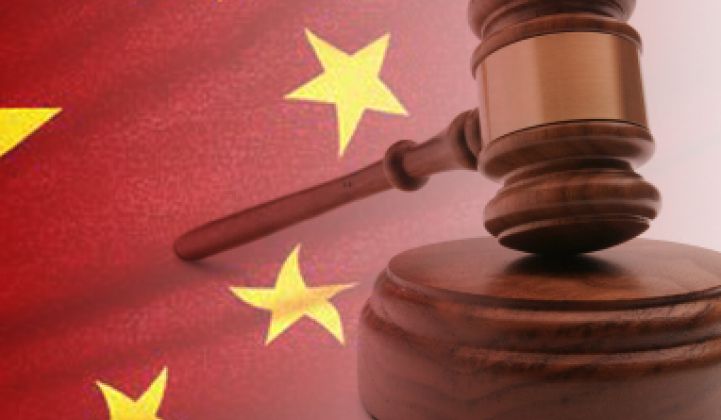There's a new legal development in the corporate espionage dispute between AMSC and the Chinese wind turbine supplier Sinovel.
China's Supreme People's Court said it will review two civil suits AMSC brought against Sinovel for stealing its proprietary software in 2011. (The employee who stole the software and sold it to Sinovel admitted guilt and was sentenced in Austria.)
One of the cases involves a cease-and-desist order, along with $6 million in damages. The other involves copyright and $200,000 in damages. These damages are small compared to the total $1.2 billion that AMSC is seeking through four lawsuits, an arbitration case and a trade secrets case.
Both of these civil suits have moved further up the courts as Sinovel fights the charges. They've finally landed in the highest court in China -- a big development for AMSC and a major milestone for ongoing international trade disputes between the U.S. and China.
"The outcome of this case will send a clear signal to companies about whether or not they can invest in China," said Melanie Hart, an expert on Chinese energy policy at the Center for American Progress, in an interview. Hart has monitored the AMSC case closely and has been talking with all parties involved.
As intellectual property theft soars in China, Communist Party leaders have said they want to do more to protect companies and encourage foreign investment. But Chinese leaders still haven't sent any strong signals about their willingness to act. The AMSC case could be their first chance to do so.
"Businesses have long been concerned about bringing their 'best and brightest' to China because of intellectual property theft. This case will show us whether things have improved, as Beijing claims," said Hart.
The saga over the theft of AMSC's intellectual property by a Chinese wind company has everything a gripping story should: espionage, money and politics.
In 2011, AMSC was riding high on the Chinese wind market, supported mostly by one of China's largest wind turbine suppliers, Sinovel. But in March of 2011, Sinovel abruptly stopped taking orders. With Sinovel representing nearly 70 percent of AMSC's business for components and electrical-control software, AMSC's stock tanked and wiped out more than 80 percent of the company's value by the fall of 2011.
AMSC soon realized that an employee had sold its proprietary voltage-control software to Sinovel, allowing the Chinese company to use a pirated version in its turbines. The employee eventually admitted to his corporate espionage and was sentenced to a year in prison.
But the case drags on in China, where Sinovel is extremely well connected in the Communist Party. One of the company's largest investors, New Horizon Capital, was co-founded by the son of China's former premier, Wen Jiabao.
Because Chinese judges report directly to the communist party, a ruling on the AMSC case will be a political signal as much as a legal one.
"There's no independent judiciary, so Chinese courts operate different ways depending on the politics," said Melanie Hart. "If a Chinese company is very connected, that makes it very tough to get a fair hearing. If you have party leaders who tell judges to decide this according to law, the court can rule fairly. It has a lot to do with politics."
Although Sinovel is well connected, the AMSC case is one that the Obama administration has talked about with top Chinese officials. And there may also be new political pressures to rule fairly on the case as China and the U.S. reportedly work on settling ongoing trade disputes over solar manufacturing.
"In a U.S. court system, this would be a clear and easy win for AMSC," said Hart. "Chinese leaders are now very aware of this case. But if you can't win in a Chinese court with this much of a smoking gun, that sends a bad message to companies."
Political influence is guaranteed in the Chinese courts, said Hart. At issue is what kind of political influence Communist Party leaders will exercise given international pressures over intellectual property rights and clean energy trade.



